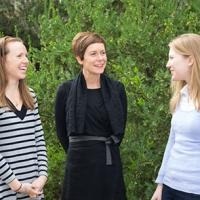ANU PhD scholars to participate in global humanities collaboration

CASS PhD students Emily Soper and Annemarie McLaren have been chosen to participate in a new project aimed at increasing collaboration in the humanities.
The project, Integrating the Humanities across National Boundaries, funded by the Andrew W Mellon Foundation, is designed to foster new forms of collaborative research and partnerships between universities that are part of the Consortium of Humanities Centers and Institutes (CHCI). ANU participation has been led by the ANU Humanities Research Centre.
Emily and Annemarie will travel to the University of California, Santa Cruz in October for the first stage of the project. Their supervisors, Dr Melinda Hinkson and Associate Professor Martin Thomas, will also participate in the overseas workshops.
Both students are conducting research that fits within the project’s theme of indigeneity in transnational contexts. They were chosen based on nominations by their supervisors and how well their project fits with this theme.
Through her research, Emily Soper from the School of Archaeology and Anthropology is seeking to understand the historical significance of what we now refer to as “vulnerable children” in the context of the Emergency Intervention in the Northern Territory of Australia in 2007.
“By focusing on child care institutions in Alice Springs I want to interrogate the racial elements of treatment of children that are tied into what we say when we talk about ‘The Intervention,’” she says.
“What I am most excited about is the opportunity to workshop my ideas with students thinking about similar issues but in very different locations. I think that this collaborative approach is really the best way to tackle graduate education as I am realising more and more from my short time at ANU how much we need discussion to stimulate our ideas.”
Annemarie McLaren from the School of History is researching a regional history of the Blue Mountains. Her environmental and cultural study will track changing perceptions and land use in the area.
“Think a multi-perspective historical account that includes wandering convicts, free-spirited emancipists, pastoralism, missing cattle, exploration, officers-turned-landed-gentry, squabbles over the role of government, and the different voices of colonial administration,” she says.
“I'm also interested in Indigenous land management and the history of cross-cultural relations as there has been no in-depth analysis of the impact of colonisation and settlement in the region. It's a particularly exciting time to be exploring this as rock-art and archaeological finds are coming to light constantly, some of it depicting scenes of contact.”
“I'm excited at the prospect on engaging with ideas, contexts and approaches outside of my immediate field. We're all looking at indigeneity in vastly different times and places and taking different disciplinary approaches.”
Partner universities involved are the University of California, Santa Cruz, the University of Wisconsin-Milwaukee and the Justus Liebig University in Giessen.
Another core goal of the project is to produce a scalable model of skills training and digital archiving for graduate researchers that can be applied in multiple contexts and to multiple themes across the humanities.









